NEW Report - Murder in Anatolia - Christian Missionaries and Turkish Ultranationalism
- Murder in Anatolia – Christian Missionaries and Turkish Ultranationalism
- Hrant Dink's shadow
- Updated Turkey-Armenia Manual 2011 – New Member state builders – impressions from Tehran

Please find below a link to ESI's first 2011 report, published today as part of a project funded by ERSTE Stiftung in Vienna:
Murder in Anatolia – Christian Missionaries and Turkish Ultranationalism
In April 2007 a triple murder took place in the Central Anatolian city of Malatya. The victims, tortured, stabbed and strangled - two Turks and one German - were Protestant Christian missionaries. Five young men, armed with knives and covered in blood, were found at the scene of the crime only moments after it happened.
Malatya murder victims
 |
 |
 |
|
Necati Aydin |
Tilmann Geske |
Ugur Yuksel |
Since early 2009 ESI has been analysing the background of this crime. What made the Malatya killings different from an ordinary murder case was the growing suspicion that this was not an isolated attack by a group of nationalist youngsters. As the investigation unfolded, serious questions began to emerge. Was the murder of missionaries in Malatya an operation by Turkey's so-called "deep state" to destabilise an elected government, targeting Christian "enemies" of the Turkish nation and making it appear as an Islamist crime?
This has certainly been the impression of the team of Turkish lawyers, a who-is-who of Turkey's most prominent human rights defenders, who have been representing the families of the victims in the Malatya trial. As Orhan Kemal Cengiz, one of these lawyers, noted in a recent op-ed:
"We have a very long history of murders, mass provocations and military coups in Turkey. Hundreds of intellectuals have been assassinated … When it comes to the political murders, assassinations and mass provocations in which "deep state" elements are involved, either no one was captured or the "suspects" were simply set free after staying in prison for a very short period."
Lawyers of the Malatya victims' families
 |
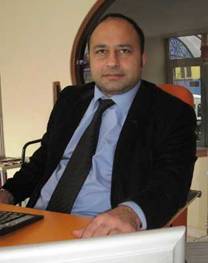 |
|
Orhan Kemal Cengiz |
Erdal Dogan |
ESI's report describes the anti-Christian campaigns supported by ultranationalist associations and writers in recent years. Writers such as Ergun Poyraz, who published Six Months among the Missionaries to show how missionaries, backed by a dangerous outside power, the European Union, were a threat to Turkey. Or Ilker Cinar, who had worked as a Protestant missionary in Turkey for over ten years, then allegedly returned to the Muslim faith in 2005 to warn society (on television and with a book) that Protestants wanted "to re-conquer the holy land" and to work with the Kurdish PKK.
In 2008 it emerged that Ilker Cinar had been on the payroll of the Turkish military since 1992 to infiltrate the small Protestant community. In 2007 Ergun Poyraz was arrested due to his links to a group of ultranationalists who were charged with having murdered a judge in Ankara in 2006 and with having formed a terror network called Ergenekon. In his home the police found many confidential military documents; the indictment includes evidence that he had been paid by the secret Gendarmerie Intelligence and Counter-terrorism Department JITEM (Jandarma Istihbarat ve Terorle Mucadele), an infamous and secret institution much discussed in Turkey in the 1990s as being responsible for mysterious assassinations.
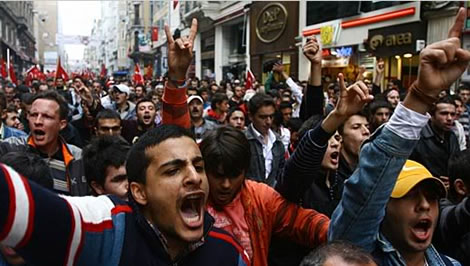 |
|
Demonstration by Turkish ultranationalists |
Our report – Murder in Anatolia – describes the worldviews and connections of Turkey's ultranationalists, from the former general secretary of the National Security Council to the activists in the radical youth organisation of the Grey Wolves. It describes how during the Malatya trial links have emerged between the Malatya suspects and ultra-nationalists elsewhere in Turkey. In October 2010 two witnesses in Malatya even explicitly linked the murders of the missionaries to JITEM.
So far 30 court hearings have taken place in Malatya. Considering the seriousness of the charges, it is striking how little attention has been paid to the Malatya trial in recent months in Turkish and international media. For anybody interested in understanding contemporary Turkish politics, and the court cases which look into the dark world of ultranationalist associations and their links to different parts of the state, the Malatya murder trial is a good place to start.
 |
|
Four Years ago: Hrant Dink's funeral – Istanbul 2007 |
Hrant Dink's shadow
On 19 January it will be 4 years since Turkish Armenian journalist Hrant Dink (who was born in Malatya) was shot in front of his office in the Istanbul Sisli district, a few months before the Malatya murders. This week Fethiye Cetin, one of the lawyers of the Dink family, published the Fourth Year Report on Hrant Dink's Murder.
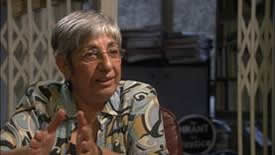 |
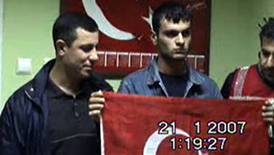 |
|
Fethiye Cetin |
Hrant Dink's murder after the assassination in a Turkish Police Station, treated like a hero |
Some of the parallels to the Malatya case are striking and the names of the same ultranationalists have been mentioned by witnesses in both trials. As Fethiye Cetin's previous report (2010) had already pointed out, the alleged instigator in the Hrant Dink murder case, Yasin Hayal, paid regular visits to the Trabzon branch of the gendarmerie intelligence department, whose branch director supposedly described him as "a solid boy, a clean one, [who] will do good work in the future." This notwithstanding the fact that in 2002 Yasin Hayal had beaten the Catholic priest of the Santa Maria Church in Trabzon so badly that the priest was in a coma for days. Later, in 2006 the successor priest in Santa Maria Church, Italian Andrea Santoro, was killed by another ultranationalist youth.
It remains to be seen whether Turkish courts will be able to get to the bottom of the crimes targeting religious minorities; and whether the ultranationalist subculture of hatred will finally be brought under control. One of the most important and encouraging changes in Turkey since the Malatya court case began in late 2007 has been a decrease in openly anti-Christian media reports. There has also been a noticeable decline in the violence targeting Christians in Turkey. A 2007 Report by the Association of Protestant Churches in Turkey listed 19 physical attacks, including the Malatya murders. In 2008 the number of incidents was down to 14, and nobody was killed. In 2009, the report lists only two attacks. For Orhan Kemal Cengiz there were two explanations for the drop in attacks:
"On the one hand there has been self-control by national media after the 2007 killings not to target Christians anymore. On the other hand there is the effect of the Ergenekon arrests. The kitchen in which the attacks against Christians were prepared was seriously hit."
There is still some way to go. At the most recent court hearing in Malatya in December 2010 a lawyer representing the suspects accused the murdered Christians of "planning to eliminate our religion, dividing up our country, bribing our people and financially supporting terror organisations."
The next hearing in Malatya will take place on 20 January 2011. The next hearing in the Hrant Dink case will be on 7 February 2011.
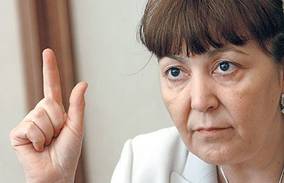 |
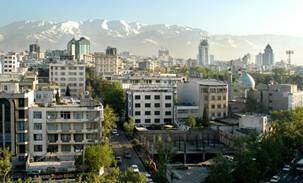 |
|
Monica Macovei – member state builder |
Northern Tehran |
Updated Turkey-Armenia Manual 2011 – New Member state builders – impressions from Tehran
In our series of user-friendly manuals for policy makers and civil society we are glad to offer – thanks to the support of Eurasia foundation – an updated manual on Turkish-Armenian relations (2011).
In our section on the experiences of the men and women who have been building EU member states throughout Central and South East Europe we are glad to introduce two more portraits: Monica Macovei, Romanian Minister of Justice from December 2004 to April 2007 and now a member of the European Parliament; and Ditmir Bushati, today a member of the Albanian parliament.
And following her recent trip late last year to Tehran (Iran), ESI senior analyst Nigar Goksel shares some of her impressions from Turkey's Eastern neighbour.
Many best wishes from Berlin,

Gerald Knaus
- NEW ESI Report – Murder in Anatolia. Christian Missionaries and Turkish Ultranationalism (2011)
- NEW Rumeli Observer – Is the deep state still smiling? Background info on Malatya case
- ESI Report – A very Special Relationship - Turkey and the EU (2010)
- NEW 2011 Manual Armenia-Turkish Relations (2011)
- NEW Monica Macovei – member state builder
- NEW Ditmir Bushati – member state builder
- NEW Nigar Goksel – Impressions from Tehran
